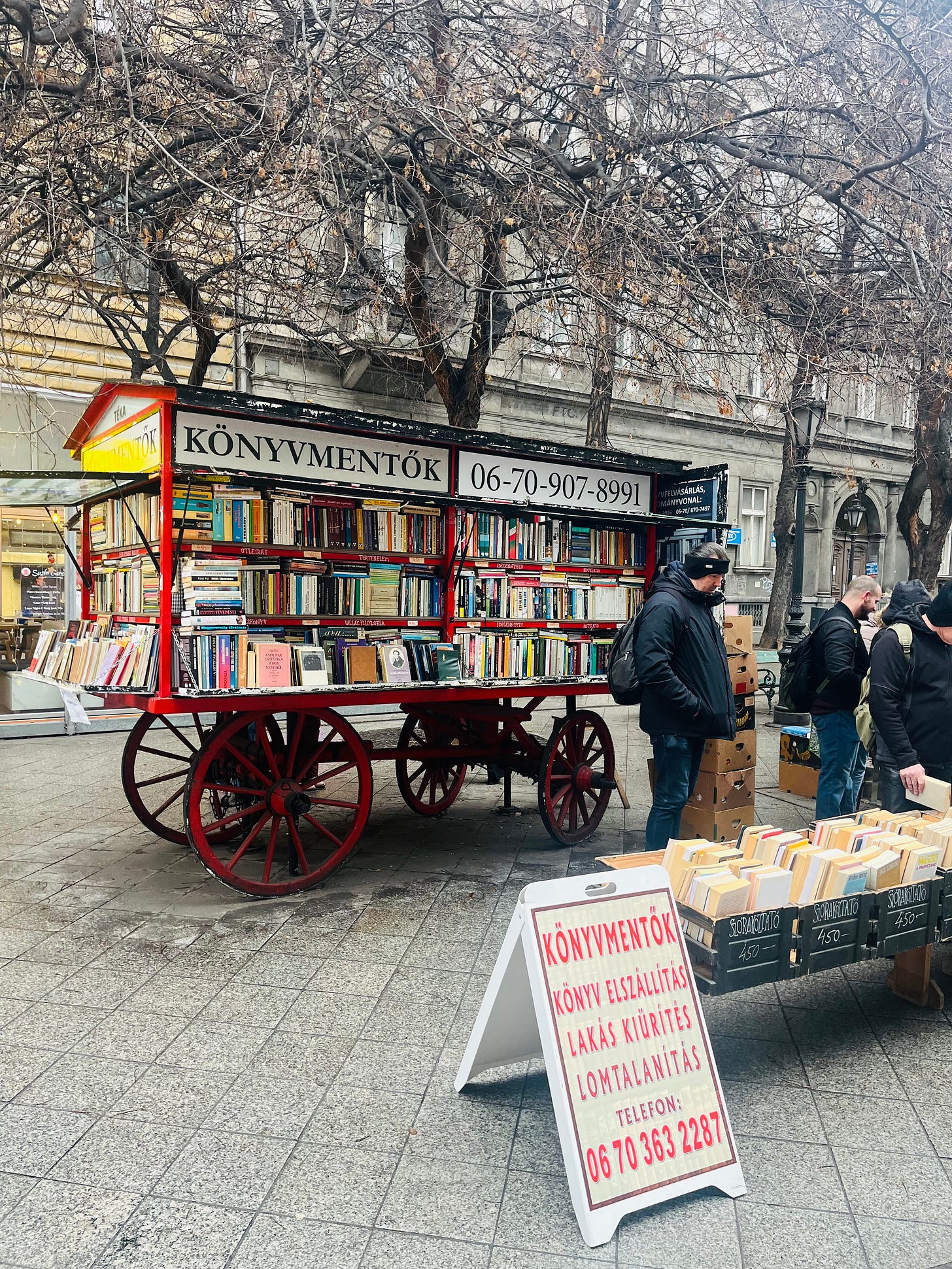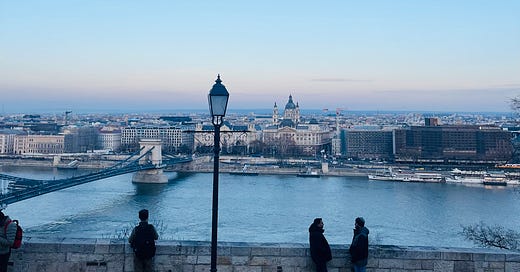I am in Budapest, writing a play
And I am having a very nice time. Life updates, thoughts on writing, bookish recommendations for the city
I am in Budapest, living in a high-ceilinged flat beside a castle, writing a play. In exchange for actual human currency. Can this be real? I keep thinking I must have tricked someone, or - even more likely - that someone is playing a trick on me. Artists don’t get salaries, after all. Certainly not to write post-apocalyptic thrillers in glamorous European cities. But it’s been more than two months now and no-one has come to take it away yet, so if it is a trick, it’s becoming a remarkably elaborate one.
It’s always good to have something you love that transcends borders to make yourself feel at home in a new city. For some people it’s sports, or food, or art. For me, of course, it’s books. I’ve been hungrily seeking out bookshops, and Budapest is certainly not short of lovely spots. There’s Massolit, in the Jewish quarter, a tiny independent store complete with cafe, garden, and regular poetry nights (where I heard one of my colleagues read a poem about his university days sharing a room with Viktor Orbán, before Orbán became… who he is), and there’s Kelet Kávéz, a book-lined cafe/bar on the Buda side of the river where I like to write in the day and then transition into red wine come nightfall.
Budapest has a pretty strong Hungarian-language reading culture (I would assume due to limited Western influence before the fall of Communism in 1989) but even when there are only a few books I can actually read I still like to browse. The most commonly stocked English author, if you’re interested, is Agatha Christie. So of course I bought a Poirot I hadn’t read before, Death in the Clouds, and was surprised by how much I enjoyed it. I went on the exact reader journey she wants you to go on - pff, there’s no way this won’t feel obvious or completely unearned. I bet I’ll guess who it is… okay, I don’t know who it is, but I bet Poirot has facts the reader hasn’t been told… and… oh my god… it was them all along! Obviously! All signs point to them! Genius! Why didn’t I get it?! I read a few essays about how Christie structures her work afterwards: apparently she starts plotting not from the moment of the murder but from five years before, which gives the outcome that lived-in, logical feel, even when a lot of the world-building doesn’t make it into the novel itself. Smart.

One of the other amazing things about my Fellowship here - which was awarded to me by The Institute of Advanced Study at CEU - is that via the ‘Interlibrary Loan Service’ I can get books sent from all over Europe which arrive as if by magic on my desk in just a few days. How does this system function?! What sort of vehicles are assigned to carry a slim volume of Caryl Churchill plays from Lisbon to Budapest? I have to know. Seriously, I see stamps on the books that show they’re from Munich or Paris or whatever. This means I’ve ordered loads of plays I’ve been wanting to read for ages and have lots of new thoughts about writing. Alistair McDowall’s work has reminded me how much you can get away with not saying - his plays are full of characters whose depth is obvious but whose full motivations and formative experiences remain unexplained. In the era of the trauma narrative, writing has a tendency to make connections obvious: this-happens-because-this-did; she-is-this-way-because-of-this. Letting things exist below the surface is so much more intriguing. Sub-text, basically. I just needed a reminder.
I also absolutely love Budapest as a city. It oozes old-world glamour and buzzes with modern vibrancy all at the same time, with spectacular classical buildings sitting alongside small plates restaurants and oat lattes and all the other ‘conveniences’ a bourgeois Londoner like me has grown accustomed to. Of course, there’s a darker side to the city - Viktor Orbán’s right-wing autocratic government has been in power in Hungary for fifteen years, slowly but surely changing legislation so it is almost impossible to vote him out, and obtaining monolithic control of the media and cultural sectors through the creation of new regulatory bodies which shut down independent broadcasters and prop up pro-government platforms. I feel for my liberal left-wing colleagues here, who tell me jarring stories about how difficult it is to exist in opposition, and it’s all pretty scary - but if I’m honest, as a tourist Orbán’s policies have not affected me much (although the fact that yesterday he banned celebrating Pride in Hungary shows he is ramping up an existing anti-LGBTQ stance, which might start to change how I’d feel existing here).
What else? Well, here is what I have learned so far from my residency:
Moving to an extremely beautiful new city and meeting lots of fun new people is enough to make me entirely happy for about three weeks. After that most of my existing struggles and anxieties and frustrations return. But somehow, it’s still better to experience them in a new place. Moving = good. It makes time slow down. I want to do it more.
It is really good to put projects down, and come back to them. I started writing the play I’m working on here in 2019 - five whole years ago. At the time I got about a third of the way through, hit a bump that felt insurmountable, and gave up - or put it aside for other projects that were working more easily. When I saw this Fellowship program come up and thought my abandoned play would be a good fit, I was pretty nervous when the time came to reopen that 2019 word doc - what if it actually was unfixable? But it turned out with all that distance it was a lot easier to see what the difficulty had been and how I could fix things. And don’t just take my word for it - Harold Pinter put his play The Hothouse in a drawer for 22 years, and when he took it out again immediately knew what he’d been aiming at two decades ago. I will never have the self restraint to do this, obviously. But maybe don’t rip up your old projects. When you’re old you might finally know what to do with them.
I LOVE BATHS. Why don’t we have public baths in England?! They are such a good way to socialise and relax! You put your body in loads of hot and cold pools and feel amazing at the end! It’s affordable so everyone does it and it feels like a nice community experience as well as extremely luxurious! It’s a way to socialise without drinking! (Actually, maybe that’s why we don’t have it in England…)
I am much more independent than I used to be. When I lived in Rome by myself for six weeks at the age of twenty, it was amazing, but if I’m honest I was pretty lonely. I felt strangely purposeless and ill at ease when I was wandering around a museum solo, as if it wasn’t real without being in someone’s company. Which is odd, actually, because I loved travelling alone in Peru when I was eighteen, so maybe independence just comes in waves. Anyway, there’s lots of reasons my Budapest experience is different to Rome: I have a big functioning flat all to myself, I have a community of English-speaking Fellows around me, and I have a real, salaried reason to be here. But it’s also true that I have liked being on my own a lot more than I expected to: going to the cinema, reading in a cafe, running around Margaret Island. I think this bodes well.
Next week (maybe even this Sunday) I’ll be back with another Fictional Therapy column - I’ve had some great submissions lately about difficult friendships and about navigating change. And, as a thank you to my paid subscribers, I am doing a bonus list right here, BELOW, of all my favourite bookish places in Budapest! Beautiful public libraries, the best neighbourhoods for book-stores, book-ish cafes, places to write, all that: this is my lived-in, off-the-beaten-track tour of Budapest for literature lovers. Thank you so much for supporting me as a free or paying reader - it means a lot.
A LITERATURE LOVER’S GUIDE TO BUDAPEST
Keep reading with a 7-day free trial
Subscribe to Fictional Therapy to keep reading this post and get 7 days of free access to the full post archives.






